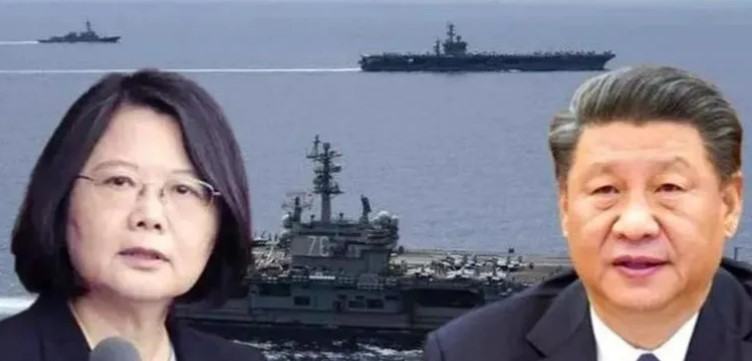Virendra Pandit
New Delhi: During the Covid-19 lockdowns in 2020, Communist China saw an opportunity in a global crisis and attempted a military misadventure in East Ladakh, India, to divert the Chinese people’s attention from the Wuhan nursery and whip up patriotism. On Sunday the Dragon, now pulverized by a Covid tsunami itself, again tried to create a nationalist frenzy to cover up its failure to contain the pandemic: it sent several ships and warplanes to democratic Taiwan which it claims to be part of its territory.
Conducting ‘strike drills’ around the Republic of Taiwan in protest against the US defense support to the island, China sent a record 71 warplanes and seven ships to Taiwan Strait, the media reported on Monday.
According to the Taiwanese defense ministry, the People’s Liberation Army (PLA) despatched 71 warplanes and seven ships, marking the biggest daily incursion yet as Beijing protested against “collusion and provocation” by the island and the US.
In a statement on Monday, the Taiwanese defense ministry said 47 of the Chinese planes crossed the median line of the Taiwan strait, an unofficial boundary once tacitly accepted by both sides, during the 24-hour display of force. Among the Chinese planes were 18 J-16 fighter jets, 11 J-1 fighters, six Su-30 fighters, and drones.
Taipei said it monitored the Chinese moves through its land-based missile systems, and on its own navy vessels.
China, which since 1949 has claimed Taiwan as its territory, said on Sunday that it conducted “joint combat readiness patrols and joint firepower strike drills” in the sea and airspace around the island.
The PLA said the drills were a “firm response to the current US-Taiwan escalation and provocation.”
But Beijing did not specify the nature of the alleged provocations. It had protested against Taiwan-related provisions in a recently-approved US defense spending bill.
The USD 858 billion legislation, which US President Joe Biden signed on Friday last week, authorizes increased security cooperation with Taiwan and requires expanded cooperation with India on emerging defense technologies, readiness, and logistics.
Despite Washington’s so-called ‘One China Policy’, Beijing objects to continued US support for Taiwan, a self-ruled island of 23 million people off its east coast that split with the mainland during the civil war that brought the Communist Party to power in 1949. The US has no formal diplomatic ties with Taiwan but is the island’s biggest global backer and arms supplier.
Speaking at a military ceremony on Monday, Taiwan President Tsai Ing-wen reiterated the need for Taipei to boost its defense capacity because of “the continuous expansion of authoritarianism”, although she made no mention of the latest military activity.
“The more preparations we make, the less likely there will be rash attempts of aggression. The more united we are, the stronger and safer Taiwan would become,” Tsai told the assembled officers.
US arms sales to Taiwan are a constant irritant in Beijing’s relations with Washington.
On Saturday last week, the Chinese foreign ministry said it “deplores and firmly opposes” defense cooperation between the US and Taiwan and that Washington’s defense bill “severely affects peace and stability across the Taiwan Strait.”
China’s military has often used large military exercises as a demonstration of force in response to US government actions in support of Taiwan.
It conducted extensive live-fire military exercises in August this year in response to US House Speaker Nancy Pelosi’s visit to Taiwan.
Beijing, which routinely threatens to ‘unite with’ and bring Taiwan under its control, views visits from foreign governments to the island as de facto recognition of the island as independent and a challenge to China’s claim of sovereignty.
Taiwan strongly disputes China’s sovereignty claims saying only its people can decide their future.

